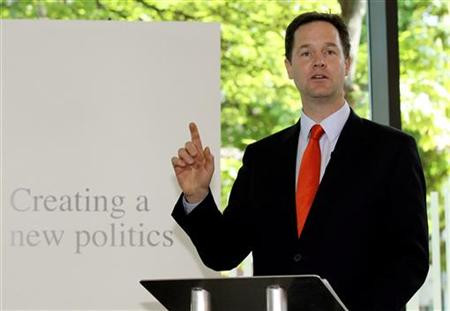Nick Clegg, leader of the Liberal Democrats, leads the charge against democracy

Nick Clegg, the Deputy Prime Minister, is also the leader of a political party that calls itself the "Liberal Democrats", quite why such a party should be at the forefront of reducing democracy in this country remains a mystery.
Shortly after the unexpected birth of the coalition government Mr Clegg and the Prime Minister David Cameron started bandying around plans for fixed term parliaments and an alarming rule that would prevent governments being brought down without the support of 55 per cent of MPs.
The proposals quickly met with resistance from both the Labour Party and from Tory MPs with more principles than power. Despite assurances from the coalition that all this was in the "national interest" and would promote "stable government" (as all attacks on liberty are described) critics of the scheme could not help but feel this was a grotesque stitch up.
Now however Mr Clegg has ratcheted up the stakes by saying that the five year parliaments (and most likely his five year term as Deputy PM) will be protected by a rule which will prevent the dissolution of parliament without the support of 66 per cent of MPs.
To claim that such a change in the political system is in the national interest is to claim that even if a government is corrupt, impotent, hated by the people and tearing itself to pieces it will still be in the national interest to keep it no matter how dysfunctional it becomes.
Quite why this is in the national interest is not clear. But it is clear that it would be beneficial to the corrupt, impotent and hated politicians who could still enjoy the perks of office until their time runs out.
None of these disasters have yet befallen the coalition government, it is still experiencing what passes for a honeymoon period in these austere times (at least the Tories are if the polls are to be believed).
It may happen that the coalition government will perform better than its critics give it credit for, in which case why does it need this huge constitutional barrier to protect it? Equally if it turns out to be total disaster why would we as a nation want to protect it with the 66 per cent barrier? One might almost say it would be in the national interest to get rid of it ahead of time to restore good governance to the country.
The fact that parliaments will be protected for five years rather than four must also raise alarm bells and here any claim that Mr Cameron and Clegg are acting in the national interest must surely be laughed out of the room.
Before they held office together both men, but especially Mr Cameron berated the former Prime Minister Gordon Brown for not having the courage to call an early election at a time when he was deeply unpopular.
If Mr Cameron had had his way we would have had the election last year or even in 2007, just four and two years respectively into the last parliament.
No one then was saying we should have a fixed term of five years. Now that they are in office however it seems that Mr Cameron and Mr Clegg are so keen on having a five year parliament they want to fix it in law, something the "Stalinist" Mr Brown never even attempted.
Such a move will be bad for democracy. When the maximum length of a parliament was set at five years almost one hundred years ago it was the intention that parliaments would generally last four years, with five being the exception.
In cases where the term has been five years it is usually done by unpopular leaders attempting to hang on to the last minute (think John Major and Gordon Brown). It is telling that the coalition has not even mentioned the possibility of having fixed terms off four years.
Not everything the coalition is proposing under its lead reformer Nick Clegg is so worthy of suspicion however. The proposal to make all constituencies of equal size is definitely to be welcomed.
It is quite absurd, not to mention unfair, that the number of people electing rural MPs is sometimes double that required to return a urban MP, meaning that one could legitimately claim that some Tory MPs are worth two Labour ones. Not surprisingly Labour has opposed this change, presumably it is against the same "national interest" which their opponents love so much.
It would be nice if our politicians could at least be honest with us and say outright that actually they do not want to review boundaries as they would get less seats and that they want fixed term parliaments because they rather like being in office without having to worry about losing it unexpectedly.
Failing that however it would be good if at the very least they could stop acting to protect themselves and remembered that they are there to serve the people. They should stop treating the British constitution with contempt in order to serve their own interests and should get on with the job of governing. If they do well they will be rewarded with re-election, if they make a mess of it they will be kicked out. That may not be their definition of "national interest" or "stable government", but it is democracy.
© Copyright IBTimes 2025. All rights reserved.





















